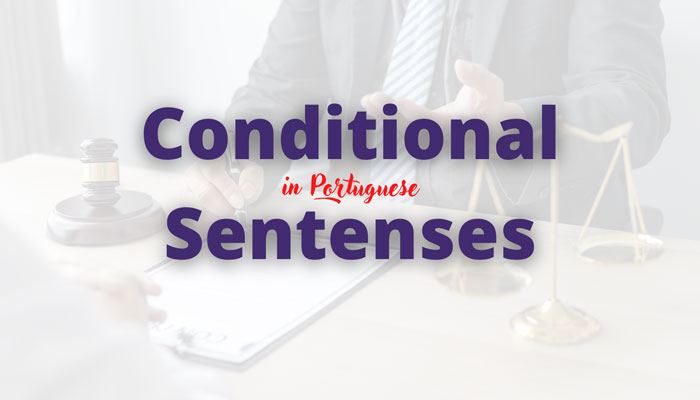The Conditional Sentences
Despite the fact that there are several verbal tenses and many other grammatical structures in Portuguese, there are only a few variants of conditional sentences. They are a combination of the knowledge that we already have. Of course, there will be something new. It’s time to take a closer look at this topic.

Reality and regularity
If we simplify the explanation of what conditional sentences are, then let’s say this: there is a clear dependence of one action or state on another. All described actions and states are real, repeatable and connected with each other. For exemple:
Se vou visitar algum país, frequento um curso básico da língua local. (If I’m going to visit a country, I go to the basic language course of that country.)
Se queres falar português, estuda. (If you want to speak Portuguese, study.)
Se comes muito açúcar, engordas rápido. (If you eat a lot of sugar, you get fat quickly.)
It is difficult to argue with these expressions. The connection between actions is logical. So there is no need to invent anything. We use the regular present tense, Presente do Indicativo, in both parts of the sentence. Sometimes, as in the second example, we need to use an imperative. Also, don’t forget the word “se” (if), which creates the conditionality of the phrase.
If you remember schematically, then:
Se + Presente do Indicativo // Presente do Indicativo ou Imperativo
We use this rule when we talk about the real, about what is definitely possible in the present and future.
Hypothetical situation
This situation has not happened yet and may happen in the future. It is quite real and does not require special circumstances.
The chances of it happening are 50/50.Se vieres mais cedo, vamos ver um filme. (If you come early, we’ll watch a movie.)
Se tivermos tempo, visitamos este museu. (If we have time, we will visit this museum.)
Se vocês abrirem um negócio, contratem-me. (If you open a business, hire me.)
You can see in the examples that in the subordinate part of the sentence after the word “se” we use Futuro do Conjuntivo, and in the main part of the sentence, you can use either the future or the present tense or the imperative.
For exemple:
Se + Futuro do Conjuntivo // Presente/Futuro do Indicativo ou Imperativo
We use this option only when we talk about the future. We cannot estimate how possible or improbable events are because we do not know our future.
Unreal Situation Now
If at the moment and in the near future such a situation cannot arise, but in the future it is not excluded, we need to use another rule. Let’s look at examples, and then find out the nuances.
Se eu tivesse mais dinheiro, comprava um carro melhor. (If I had more money, I would buy a better car.)
Se tivéssemos mais tempo, viajaríamos mais. (If we had more time, we would travel more).
Se eu fosse a ti, mudava de profissão. (If I were you, I would change my profession.)
This conditional sentence is used when we are talking about the present tense. However, unlike the paragraph “reality and regularity”, this option tells us that so far these actions cannot happen. As for the last example, this is hypothetical. Of course, this will never happen, but you can always be in the place of another person. Becoming a different person is unrealistic, but being in his position is quite possible.
In short:
Se + Imperfeito do Conjuntivo // Imperfeito do Indicativo ou Condicional Simples
Absolutely Unrealistic Situation
You probably already guessed that we will talk about the past tense. What has already happened cannot be fixed. The construction of this conditional phrase is as follows:
Se + Pretérito Mais-que-Perfeito do Conjuntivo // Condicional Composto
Don’t be afraid of long names. We will now show you what this means in practice:
Se eu tivesse dado mais atenção, tu tinhas ficado comigo. (If I gave more attention, you would stay with me.)
Se tivesses estudado mais, tinhas passado no exame. (If you had studied more, you would have passed the exam.)
That is, you can navigate like this: the condition precedes the action. The past tense in Portuguese is described with Pretérito Mais-que-Perfeito Composto do Indicativo. But due to the fact that the action is unrealistic, it is necessary to edit. Namely, add the ending to the verb “ter” (to have) in the desired form. See the end table below:
| Ending of verbs | |
| Eu< | -sse< |
| Tu< | -sses< |
| Ele, ela, você< | -sse< |
| Nós< | -ssemos< |
| Eles, elas, vocês< | -ssem< |
Thus we get the fourth species from the “Conjuntivo” list: Pretérito Mais–que–Perfeito Composto do Conjuntivo. In the second part of the sentece, we use Pretérito Mais–que–Perfeito Composto do Indicativo. We remind you that all “Composto” tenses consist of the verb “ter” and particípio passado (past participle).
We want to say that in colloquial speech this type of conditional sentences is not often used. And in general, it is not at all necessary to memorize absolutely all the details. What you need in a speech is determined only by your desire to express thoughts, so complex forms can always be avoided. One thing is for sure – you can’t do without conditional sentences!
And the rest in this topic, everything depends on the part of the sentence that comes after the word “se“. That is, we cannot use the rule from the first paragraph in the first part of the sentence, and from any other paragraph in the second.
Conclusion
Perhaps today we were able to cover the entire amount of information on conditional sentences. We touched on the past, present and future. More examples and more conversational practice you will get in our school. See you in class!
Leave a Reply